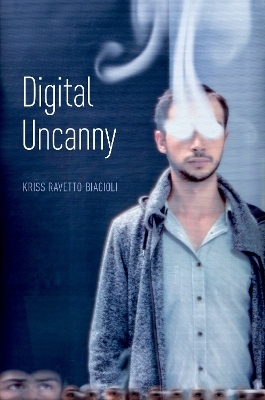
Digital Uncanny
Seiten
2019
Oxford University Press Inc (Verlag)
978-0-19-085399-0 (ISBN)
Oxford University Press Inc (Verlag)
978-0-19-085399-0 (ISBN)
Through a close reading of interactive and experimental art works, this book explores how the digital uncanny unsettles concepts of "self," "affect," "feedback," and "aesthetic experience," forcing us to reflect on our relationship with computational media and by extension our relationship to each other and our experience of the world.
We are now confronted with a new type of uncanny experience, an uncanny evoked by parallel processing, aggregate data, and cloud-computing. The digital uncanny does not erase the uncanny feeling we experience as deja vu or when confronted with robots that are too lifelike. Today's uncanny refers to how non-human devices (surveillance technologies, algorithms, feedback, and data flows) anticipate human gestures, emotions, actions, and interactions, thus intimating that we are but machines and that our behavior is predicable precisely because we are machinic. It adds another dimension to those feelings in which we question whether our responses are subjective or automated - automated as in reducing one's subjectivity to patterns of data and using those patterns to present objects or ideas that would then elicit one's genuinely subjective-yet effectively preset-response. In fact, this anticipation of our responses is a feedback loop that we humans have produced by designing software that can study our traces, inputs, and moves. In this sense one could say that the digital uncanny is a trick we play on ourselves, a trick that we would not be able to play had we not developed sophisticated digital technologies. Digital Uncanny explores how digital technologies, particularly software systems working through massive amounts of data, are transforming the meaning of the uncanny that Freud tied to a return of repressed memories, desires, and experiences to their anticipation. Through a close reading of interactive and experimental art works of Rafael Lozano-Hemmer, Bill Viola, Simon Biggs, Sue Hawksley, and Garth Paine, this book is designed to explore how the digital uncanny unsettles and estranges concepts of "self," "affect," "feedback" and "aesthetic experience," forcing us to reflect on our relationship with computational media and by extension our relationship to each other and our experience of the world.
We are now confronted with a new type of uncanny experience, an uncanny evoked by parallel processing, aggregate data, and cloud-computing. The digital uncanny does not erase the uncanny feeling we experience as deja vu or when confronted with robots that are too lifelike. Today's uncanny refers to how non-human devices (surveillance technologies, algorithms, feedback, and data flows) anticipate human gestures, emotions, actions, and interactions, thus intimating that we are but machines and that our behavior is predicable precisely because we are machinic. It adds another dimension to those feelings in which we question whether our responses are subjective or automated - automated as in reducing one's subjectivity to patterns of data and using those patterns to present objects or ideas that would then elicit one's genuinely subjective-yet effectively preset-response. In fact, this anticipation of our responses is a feedback loop that we humans have produced by designing software that can study our traces, inputs, and moves. In this sense one could say that the digital uncanny is a trick we play on ourselves, a trick that we would not be able to play had we not developed sophisticated digital technologies. Digital Uncanny explores how digital technologies, particularly software systems working through massive amounts of data, are transforming the meaning of the uncanny that Freud tied to a return of repressed memories, desires, and experiences to their anticipation. Through a close reading of interactive and experimental art works of Rafael Lozano-Hemmer, Bill Viola, Simon Biggs, Sue Hawksley, and Garth Paine, this book is designed to explore how the digital uncanny unsettles and estranges concepts of "self," "affect," "feedback" and "aesthetic experience," forcing us to reflect on our relationship with computational media and by extension our relationship to each other and our experience of the world.
Kriss Ravetto-Biagioli is a film and media scholar whose work focuses on representations and theorizations of violence in media, interactive art, film, and social media. She is the author of The Unmaking of Fascist Aesthetics (2001), Mythopoetic Cinema: On the Ruins of European Identity (2017), and many articles on film, performance, installation art, new media, and the hacker group Anonymous. She is the co-editor with Professor Martine Beugnet of the series in Film and Intermediality.
Introduction
Chapter 1: Self-Uncanny
Chapter 2: Uncanny Affect
Chapter 3: Uncanny Feedback
Epilogue: Uncanny Aesthetics
Bibliography
Index
| Erscheinungsdatum | 29.01.2019 |
|---|---|
| Zusatzinfo | 29 photographs |
| Verlagsort | New York |
| Sprache | englisch |
| Maße | 239 x 160 mm |
| Gewicht | 562 g |
| Themenwelt | Kunst / Musik / Theater ► Film / TV |
| Sozialwissenschaften ► Kommunikation / Medien ► Medienwissenschaft | |
| ISBN-10 | 0-19-085399-9 / 0190853999 |
| ISBN-13 | 978-0-19-085399-0 / 9780190853990 |
| Zustand | Neuware |
| Haben Sie eine Frage zum Produkt? |
Mehr entdecken
aus dem Bereich
aus dem Bereich
wie KI und virtuelle Welten von uns Besitz ergreifen – und die …
Buch | Hardcover (2023)
Heyne (Verlag)
CHF 29,90
eine jüdische Filmgeschichte der Bundesrepublik
Buch | Hardcover (2023)
Hanser (Verlag)
CHF 39,20


